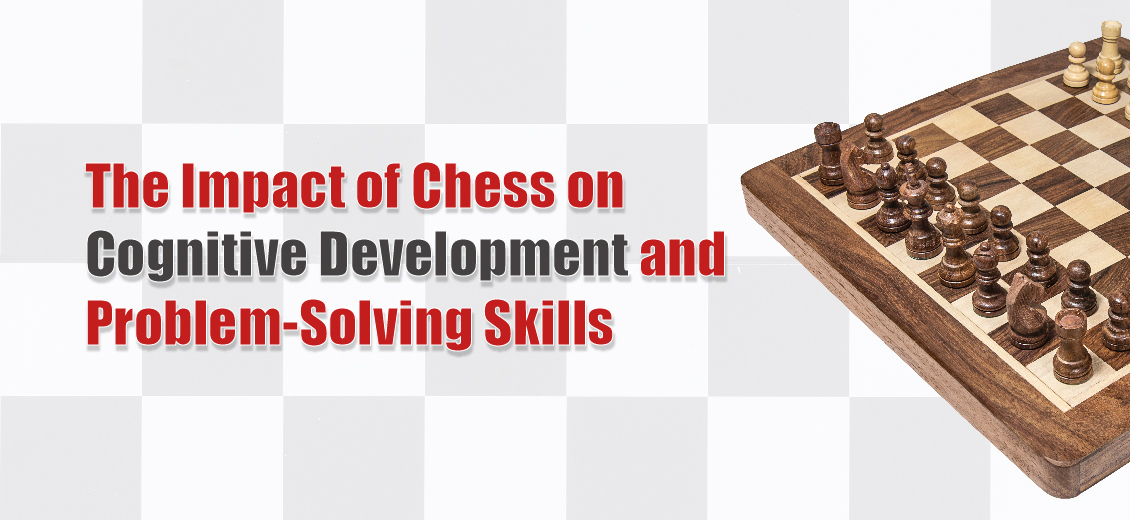The Impact of Chess on Cognitive Development and Problem-Solving Skills
Blogs Home
- 20 Jul 2023

Chess, a game of strategy, wits, and endurance, has captivated players worldwide for centuries. The game's intriguing mix of simple rules and infinite complexity has made it an enduring symbol of intelligence and strategic thinking.
The origin of chess dates back to the 6th century, with roots in Northern India. Originally known as 'chaturanga', this game swiftly found favour within Persian society and progressively disseminated across the globe through routes of Islamic invasions, trade, and cultural exchanges. From the magnificent courts of vast empires to the simple surroundings of local town parks, chess has weathered the passage of time, now globally acknowledged as one of humanity's oldest strategic games.
Chess's international popularity is quite remarkable, surpassing boundaries, cultures, and languages. It's believed that hundreds of millions of individuals engage in chess, with over 605 million adults participating at least once annually. The game's global influence is manifested in diverse ways – ranging from children learning initial chess manoeuvres in classrooms, and competitive tournaments featuring grandmasters, to online platforms bridging chess aficionados from different parts of the planet.
But chess is more than just a game. Numerous research initiatives have indicated the beneficial impacts of chess on cognitive development and problem-solving capabilities, spotlighting its meaningful role beyond pure amusement. The game's status as a potent instrument for cognitive improvement has resulted in its comprehensive integration into global educational curricula, from primary schools to tertiary institutions and even adult learning programs.
From nurturing analytical thinking to enhancing memory and creativity, the effect of chess on cognitive growth is indeed captivating. Welcome to an exploration through the enchanting realm of chess, a game that transcends merely moving pieces on a board.
Cognitive Development
Cognitive development is the process that helps to develop and evolve our brains. It influences the capability of an individual to think, learn, understand, and do problem-solving. It is not limited to information absorption but comprehending the environment and developing meaningful interpretations.
Cognitive development theory was primarily established by the Swiss psychologist, Jean Piaget. He proposed that as we grow, we pass through distinct stages of cognitive development, each characterized by unique ways of thinking and understanding. These stages - from sensory development in infancy to the ability to think abstractly and hypothetically in adolescence - highlight the remarkable transformation our cognitive skills undergo throughout our lives.
So, what is the importance of developing cognition? Cognition is the stepping stone of any individual’s learning and problem-solving skills. As our cognitive skills mature, we can enhance information processing, and work with complex ideas. It also improves decision-making, finding solutions to problems. These essential skills can be developed through a game of chess.
Imagine your brain as an intricate network, with each cognitive skill representing a node in this network. Learning and problem solving activities need help from the nodes. These activities demand the ability to recall data, understand the current situation, identify any solution, analyze these solutions, and use the most effective decision-making.
From the viewpoint of chess, each move you make is driven by the cognitive network. When you play chess, complex decisions like identifying the situation on the board, analyzing the movement of the opponents, and formulating the next step strategy involve the use of cognitive problem-solving.
Chess as a Mental Exercise
Chess, often regarded as the 'gymnasium of the mind,' offers an intriguing combination of mental tasks that exercise our cognitive muscles like few other activities can. Let's dive into the key aspects of this mental workout regimen and see how they contribute to cognitive development.
Strategic Thinking: Playing a game of chess is like telling a complex, evolving story where each move might echo throughout the rest of the narrative. This activity requires strategic planning, a cognitive task that stimulates our frontal lobes, the brain region associated with decision-making and problem-solving. Regular engagement in strategic thinking doesn't only refine our skills in planning and forecasting but also boosts our adaptability. We learn to adjust our strategies based on the fluctuating dynamics of the game.
Pattern Recognition: Chess is a game steeped in patterns, from the opening sequences of moves to the positioning of pieces on the board. Recognizing these patterns, understanding their implications, and predicting what they might lead to in the future turns to engaging our visual-spatial skills and memory, essential elements of cognitive development. This ability to recognize and understand patterns can translate into real-world problem-solving, where finding patterns can often lead to innovative solutions.
Decision Making: In chess, each move represents a decision, made after evaluating multiple possibilities and their potential outcomes. This process hones our decision-making skills, especially under conditions of uncertainty and pressure. It also enhances our ability to think ahead, evaluate risks, and foresee consequences, strengthening our executive functions that govern planning, focusing attention, remembering instructions, and juggling multiple tasks successfully.
Concentration: Chess is a game of focus and sustained attention. From tracking the movement of multiple pieces on the board to keeping an eye on the clock, chess demands and nurtures our ability to concentrate. Research indicates that concentration, like a muscle, can be strengthened over time, and the intense focus required in chess can lead to improvements in our ability to concentrate in other areas of life as well.
In essence, when we sit down to play a game of chess, we are not just indulging in a leisurely activity. We are participating in a full-fledged cognitive workout, flexing and strengthening our cognitive muscles. The game's inherent demand for strategic thinking, pattern recognition, decision-making, and concentration offers a potent mix of mental exercises that can spur cognitive development, and refine our problem-solving abilities. It's little wonder that chess continues to captivate and challenge us, even centuries after its inception.
Chess Enhances Problem-Solving Skills
In every walk of life, from academics and career to personal decisions and interactions, problem-solving is a vital skill. It is the ability to understand a situation or challenge, identify possible solutions, evaluate them, and finally, implement the most appropriate one. The beauty of problem-solving skills is their universality - regardless of the context, these skills remain central to overcoming obstacles and achieving goals.
Let's now explore how chess can boost problem-solving capabilities. Each chess match offers players a series of intricate situations, each necessitating a solution - the ideal move. To uncover this move, players must assess the position, predict potential opponent reactions, evaluate various strategies, and make a decision - all under the constraint of a steadily ticking clock.
This process closely mirrors real-life problem-solving. Just as a chess player looks at the whole board to strategize, successful problem solvers take a holistic view of challenges, considering all elements before determining a solution. Like a chess player who anticipates an opponent's moves, effective problem solvers predict potential obstacles and preemptively address them. And just as a chess player makes the final move, decisive problem solvers implement their chosen solutions with confidence.
Memory and Visualization: Engaging in a game of chess isn't merely a physical act of moving pieces on a board. A substantial part of the game unfolds in the mind's eye, leveraging memory and visualization skills - invisible tools that can be honed to near perfection through regular play.
A strong memory plays a vital role in chess. From remembering the rules and how each piece moves, to recalling past games and typical strategies, memory is a constant ally of the chess player. During a game, players must remember the sequence of moves that have led to the current position, enabling them to understand how the game has evolved and which strategies are working. This active engagement with memory during chess can lead to improvements in memory retention.
Visualization is another crucial cognitive skill that chess enhances. Visualizing isn't just about seeing the current state of the game board; it's about picturing future possibilities. Chess players must constantly imagine the potential outcomes of different moves, playing out these scenarios in their minds before deciding on their actual moves. This requires a robust ability to mentally manipulate images, a skill known as spatial visualization. Regular practice of chess, with its demand for continuous mental manipulation of the game board, can significantly enhance this skill.
Whether you're a seasoned player or a novice, each game of chess is an opportunity to polish these vital cognitive tools, equipping you for challenges beyond the chessboard.
Logical Reasoning: At its core, chess is a game of logic. It stimulates the use of deduction (deriving specific conclusions from general rules), induction (inferring general principles from specific instances), and inference (drawing conclusions based on reasoning). For instance, a player might deduce that an opponent's piece is in danger based on the positions of their own pieces. Similarly, a player could induce a strategy after observing recurring patterns in their opponent's moves. These logical principles, honed through chess, can significantly aid decision-making in real-life scenarios.
Creativity and Flexibility: Despite its grounding in logic, chess also promotes creativity. The game encourages players to think outside the box, adapt to changing circumstances, and explore alternative solutions. There's always more than one way to achieve checkmate, and the path you choose can be a testament to your creative thinking. This flexibility can translate into real-world problem-solving, where creative, unconventional solutions often lead to breakthroughs.
Psychological Benefits of Playing Chess
Beyond cognitive skills, chess offers numerous psychological benefits. The game helps improve self-confidence as players experience the rewards of strategic planning and problem-solving. It teaches patience and resilience, given that games can be long and outcomes are uncertain until the very end. Moreover, chess cultivates emotional control, as success often depends on maintaining calm under pressure. These traits, which contribute to mental resilience and emotional intelligence, are integral to overall cognitive development.
Educational Applications
Given its cognitive benefits, chess has found a place in educational curriculums worldwide. Incorporating chess into classroom activities can enhance cognitive abilities and problem-solving skills among students. It can also make learning more engaging, fostering skills such as focus, strategic thinking, and patience, which are beneficial for academic success.
Case Studies and Research
Multiple studies have highlighted the positive effects of chess on cognitive development. A study published in 2016 titled "Checkmate to Alzheimer's: Chess as a mental workout" discusses how chess can improve various cognitive functions. Another study by Robert Ferguson, "Chess in Education Research Summary," states that test scores improved by 17.3% for students regularly engaged in chess classes, compared with only 4.6% for children participating in other forms of "enrichment activities."
Conclusion
In summary, chess is a powerful tool for cognitive development and problem-solving. Its strategic, logical, creative, and psychological aspects offer a comprehensive workout for the mind. The benefits of chess extend beyond the game, influencing academic performance, decision-making, and emotional resilience. Many researches have underscored the positive impact of chess on our cognitive abilities. As we increasingly recognize these benefits, the promotion of chess education in society is not just about fostering future grandmasters, but also about empowering individuals with the cognitive and psychological tools to navigate the challenges of life. So, whether you're an avid chess player or a curious novice, every move on the chessboard is a step toward cognitive enhancement.
Sources:
http://www.academiadesah.ro/wp-content/uploads/2016/08/checkmate_to_alzheimers.pdf
http://www.scholasticchess.mb.ca/docs/ciers.pdf
Shounak Roy

He finds pleasure in the hunt for knowledge, eagerly seeking to learn something new about anything that interests him. He describes himself as a simple and peaceful individual, always curious to delve deeper into various subjects. If he comes across someone with shared interests, he enjoys engaging in discussions and exchanging knowledge.
Blogs Home



